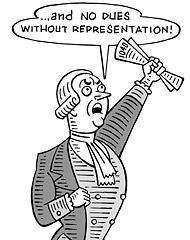Due(s) Day
 Like many Americans, I’ve got conflicted feelings about taxes. On the one hand, I recognize that they are the price we pay for civilized society. On the other hand, I cringe (or worse) each time I pay them — because I have, er, serious doubts about the efficacy of handing over my hard-earned money to George Bush and Nancy Pelosi.
Like many Americans, I’ve got conflicted feelings about taxes. On the one hand, I recognize that they are the price we pay for civilized society. On the other hand, I cringe (or worse) each time I pay them — because I have, er, serious doubts about the efficacy of handing over my hard-earned money to George Bush and Nancy Pelosi.
I also face a double-whammy since I work for myself. Instead of having taxes withheld from my paycheck — which eventually conditions people into expecting to receive less than they earn — I write eight tax checks a year. (Four checks go to the feds; four go to my local government, the District of Columbia.) For me and my ilk, this changes the psychology of taxation. Taxes are visible in a way they aren’t to people conditioned to withholding.
So it was with both amusement and fascination that I read Richard Coniff’s op-ed in today’s New York Times in which he proposes progressives reframe the tax debate by calling these payments “dues” rather than “taxes.” Interesting. Dues suggest a certain reciprocity; We pay them in order to receive certain benefits. Taxes, meanwhile, sound punitive.
Will it work? I have my doubts. I don’t want Bush and Pelosi spending my “dues” either. Then again, I thought that reframing the estate tax as the “death tax” was a joke. Let me know what you think of this linguistic maneuver.
If it’s called tax or sliced ham the result is the same. Changing the name won’t change you writing out those eight checks per year. Will it make the activity more enjoyable? I don’t think so but then again I think mankind doesn’t like to share in general.
Making the difference between having money taken out at the source and having to write the tax checks eight times a year puts a finger on the tender spot. You (me too for that matter) have the impression of sharing a percentage of your earnings and apart from the problems you may have with governmental policies, like I said I think people don’t like being forced to share which is the idea of taxing something in the first place.
If you have the priviledge to be benevolent the attitude probably changes. People give money away all the time (mostly as a tax dodge…) and they are happy to do so. However making tax a choice would mean people would probably choose to pay about a dollar fifty per year and probably want to see exactly where the money is going.
So, I got nothing really. Sorry for the ramble.
The solution is clearly “death dues”. But seriously, reframing this so we pay “dues” is an attempt to make compliance patriotic. I don’t see anything patriotic about giving money to Pelosi and Bush. And ask your run of the mill progressive his thoughts about “road dues” and see how quickly he changes his tune.
A tax is confiscation of money by a government. There is nothing voluntary about taxes. “Dues” would mean paying something voluntarily to an organization which I want to join such as the local chamber of commerce. I would never voluntarily pay for people to go to Iraq and kill civilians. Yet that is what happens with some of the tax money which I pay to the US government. Taxes are paid involuntarily by force and coercion. If you decide not to pay your taxes then there is a high likelihood that your property will be confiscated by the government and that your liberty could be compromised. That is you could easily be sent to jail. Take a look at http://www.mises.org.
I remember learning about the Boston tea party and ‘taxation without causation’ in elementary school. I also remember not being able to figure out what a ‘tax’ was. I just didn’t get it. Maybe some of you brilliant minds out there did not have a problem with this as tykes, but I certainly did. Calling taxes ‘dues’, like paying your dues for the Girl Scouts, might make it easier for kids, and maybe even some ‘dues-paying’ adults today, to figure out that their taxes are not going into some black hole never to be seen again, but are actually supposed to be used for societal benefit.